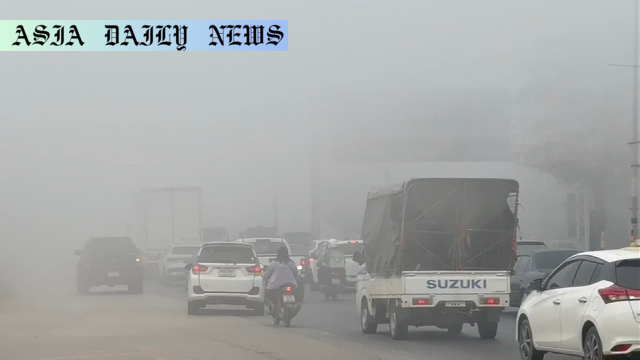Air Pollution: Smoke from emissions and agricultural burning disrupts Bangkok, forcing school closures and remote work guidelines.
- Key Point 1: Worsening air pollution in Bangkok forces school closures and remote work advice.
- Key Point 2: PM2.5 pollutants from vehicular emissions and agricultural burns are key contributors.
- Key Point 3: Authorities introduce public transport discounts and limit heavy vehicle routes.
- Key Point 4: Air pollution peaks during dry and stagnant seasonal weather.

Overview of Thailand’s Air Pollution Crisis
Thailand is grappling with a severe air pollution crisis that has disrupted daily life across the country, especially in Bangkok, the capital city. The ongoing crisis is characterized by rising levels of fine particulate matter (PM2.5), which has exceeded safe limits in many areas. This hazardous air quality has forced the closure of over 300 schools, prompting authorities to request citizens to work from home and avoid outdoor activities. The health risks associated with prolonged exposure to such pollution are significant, as PM2.5 has been linked to respiratory and cardiovascular problems.
Major Contributors to Air Pollution
The sharp rise in air pollution levels can be attributed to a combination of vehicular emissions and agricultural burning. During this season, a dry and stagnant atmosphere exacerbates pollution, preventing the dispersal of harmful particulate matter. Vehicular emissions from cars and trucks are a significant source of pollution, especially in urban areas like Bangkok. At the same time, widespread agricultural practices, particularly the burning of fields post-harvest, have worsened the air quality situation nationwide.
Impact on Daily Life
The deteriorating air quality has had a profound effect on the daily lives of residents in Bangkok and other parts of Thailand. Beyond school closures, businesses and workplaces are adapting to the situation by encouraging remote work to minimize exposure to hazardous air. Outdoor activities have been discouraged, and many residents are wearing protective masks to safeguard against the effects of the smog. One resident noted that even with the sun out, the sky appeared cloudy and smoky due to the poor air quality, emphasizing the widespread impact of the crisis.
Government Response and Mitigation Measures
To address the pollution emergency, the Bangkok Metropolitan Administration (BMA) has introduced several urgent measures. Heavy vehicles have been restricted in parts of the capital to curb emissions, while authorities are offering free public transportation for a week, beginning Saturday. These measures aim to reduce vehicular activity and encourage more sustainable commuting within the city. Additionally, the government has initiated campaigns to raise awareness about the pollution crisis and appropriate precautions citizens should take, including the use of air purifiers and masks.
Outlook and Long-term Solutions
While officials predict that air quality may improve slightly in the coming week, the need for long-term solutions remains critical. Immediate measures, such as limiting emissions and promoting public transportation, provide short-term relief but do not address the root causes of the problem. Legislation is required to regulate vehicular emissions more strictly and to reduce dependence on agricultural burning as a land management practice. Additionally, investments in renewable energy and sustainable farming methods could help mitigate future air pollution crises.
The Health Risks of PM2.5 Pollution
Exposure to PM2.5, the airborne pollutant currently choking Thailand, poses severe health risks. These fine particulate matters, which are smaller than 2.5 micrometers in diameter, can penetrate deep into the lungs and enter the bloodstream. Prolonged exposure can lead to chronic respiratory diseases, cardiovascular conditions, and in severe cases, premature death. Vulnerable populations, including children, the elderly, and individuals with preexisting health conditions, are particularly at risk. Effective public awareness campaigns and healthcare initiatives are essential to protect these groups from the consequences of hazardous air pollution.
The Role of Community and Global Initiatives
Community engagement and global cooperation will play a vital role in combating air pollution in Thailand. Public participation in reducing emissions can include actions like carpooling, using public transportation, and reducing energy consumption at home. On a global scale, partnerships with organizations and countries committed to environmental sustainability could provide technical and financial support to address pollution comprehensively. With collaboration and sustained efforts, Thailand can work towards cleaner air and a healthier environment for its citizens.



Commentary
An Escalating Crisis
The recent reports of worsening air pollution in Thailand, particularly in Bangkok, serve as a stark reminder of the environmental challenges we face today. It is disheartening to see schools closing and residents struggling to carry out their daily routines due to something as fundamental as a lack of clean air. The high levels of PM2.5 pollution underscore the need for immediate and effective governmental action.
The Role of Urbanization and Agriculture
Urbanization and agricultural practices have undoubtedly contributed to this crisis. Bangkok, as a bustling metropolitan hub, faces the brunt of vehicular emissions, while the countryside suffers from the harmful effects of crop-burning practices. It’s a clear indication of how interconnected our urban and rural areas are when it comes to environmental issues, and how unsustainable practices in one region can drastically affect another.
The Importance of Proactive Measures
The government’s decision to provide free public transportation and restrict heavy vehicles is a commendable step forward, but more needs to be done to address the root causes of the problem. Legislative reforms to curb emissions and incentives to adopt cleaner technologies in agriculture are not just beneficial; they are imperative for sustainable development. Avoiding quick fixes and focusing on comprehensive, long-term strategies will be key to overcoming this issue.
A Call for Collective Responsibility
Ultimately, solving Thailand’s air pollution crisis requires collective responsibility. Citizens, policymakers, and businesses must work together to adopt more sustainable practices. Facing the looming health risks of air pollution may also serve as a wake-up call for greater environmental conservation efforts worldwide. Local problems often have global implications, and securing cleaner air in Thailand could inspire similar actions beyond its borders.